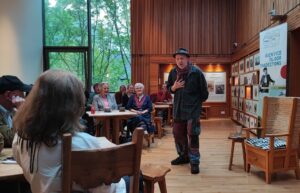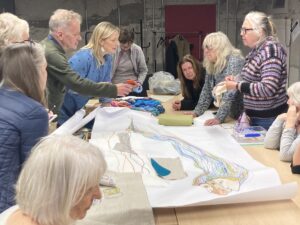Intangible Cultural Heritage in the Community Stories Programme
Introduction
In 2022, Museums Galleries Scotland partnered with VisitScotland to deliver the Community Stories Fund, as part of Scotland’s Year of Stories. As well as providing 180 community groups and organisations across Scotland with funding to host events, we also offered them a wrap-around programme of training and support. This included support for how to identify, document and safeguard Intangible Cultural Heritage, elements of which featured in many of the funded projects.
Here is an overview of the ICH support that was available to Community Stories Programme grantees and its impacts – it includes links to useful training videos, case studies and listings on the ICH Scotland website.
ICH Film
The above short film was created to introduce the concept of ICH, exploring its importance to Scotland’s culture and its relevance to the Community Stories Programme. It features footage from fourteen events supported by the fund to provide a wide range of examples of ICH activity. This includes Magic Torch Comic’s ‘Story Ceilidh’ event which featured members of Inverclyde’s multicultural community sharing traditional tales in English, Arabic and Gaelic, and Adventure Circus’s revival of an ancient fire festival celebrating the legend of the Kinnoull Hill Dragon in Perth.
Training
Peter Hewitt was employed as a part-time ICH Officer (Year of Stories) to support the Community Stories Fund grantees. In tandem with Jacob O’Sullivan, MGS’s Museum Development Manager (Collections & Interpretation), Peter delivered two online workshops to assist grantees with their understanding of ICH, and to consider what steps they could take regarding the delivery and documenting of ICH activity.
Videos of the workshops are available and are a useful tool for anyone who would like to better understand ICH in Scotland and ways to help safeguard it.
The first workshop – Introduction to Intangible Cultural Heritage – explores definitions and examples of ICH, as well as outlining its background and importance to society.
The second workshop – ICH: Overview and Next Steps – covers MGS’s plans to help safeguard and support ICH in Scotland, key concepts of ICH, suggestions for how the heritage sector could engage with ICH, and an overview of the ICH Scotland website.
Listings on the ICH Scotland website
Throughout 2022, ICH Officer Peter Hewitt met with multiple grantees whose projects contained strong elements of ICH to provide them with one-to-one advice. Following on from this engagement, listings of 48 Community Stories projects were added to the ICH Scotland website, helping to enrich this database of ICH practices and living cultural heritage in Scotland. They can be viewed on the Storytelling section of the website.
Case studies
Details of four Community Stories projects which featured ICH have been shared with grantees, and the wider museums and galleries sector, for learning purposes.
MGS invited two grantees to talk about their Community Stories projects as part of an ICH knowledge exchange event held in March 2023. Dr Valentina Bold discussed ‘Up the Middle Road’, an exploration of creative responses to the history of mental health treatment at Crichton Hall in Dumfries, while Janos Lang spoke about Ando Glaso’s ‘Tales of a Travelling Scotland’ project which showcased new commissions of stories and live music from Scotland’s indigenous GRT (Gypsy, Roma and Traveller) communities. He also discussed Ando Glaso’s work more widely, and delivered a performance of traditional Roma music. Videos of these talks will be available here soon.
Two written ICH case studies can be accessed below. The first looks at Tobar an Dualchais’ project which engaged professional storytellers to bring to life traditional Scottish tales from their online audio archive. This project highlighted that archives and museums – far from being the domains of specialist scholars and curators – are in fact the well-spring of vibrant, inclusive community-based culture. The second case study explores Gairloch Museum’s Festival of Stories project which included the creation of a ‘room for stories’ in the heart of the museum. Turning a museum into an inclusive and participatory space, where ‘transmission’ of traditions is possible, is of central importance to the safeguarding of ICH in Scotland.

